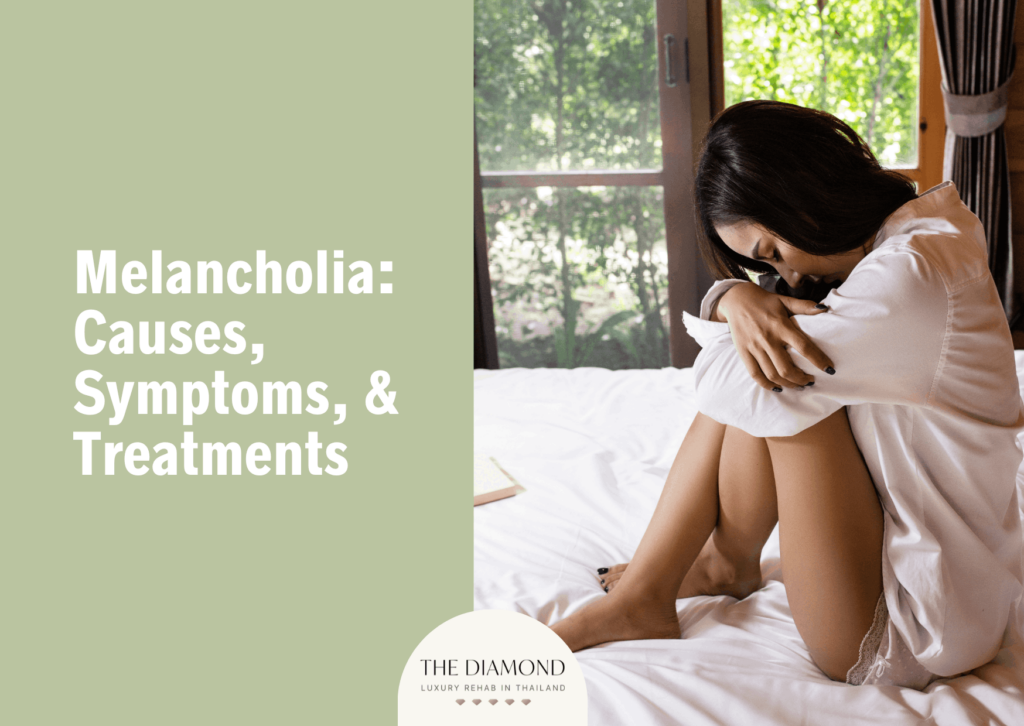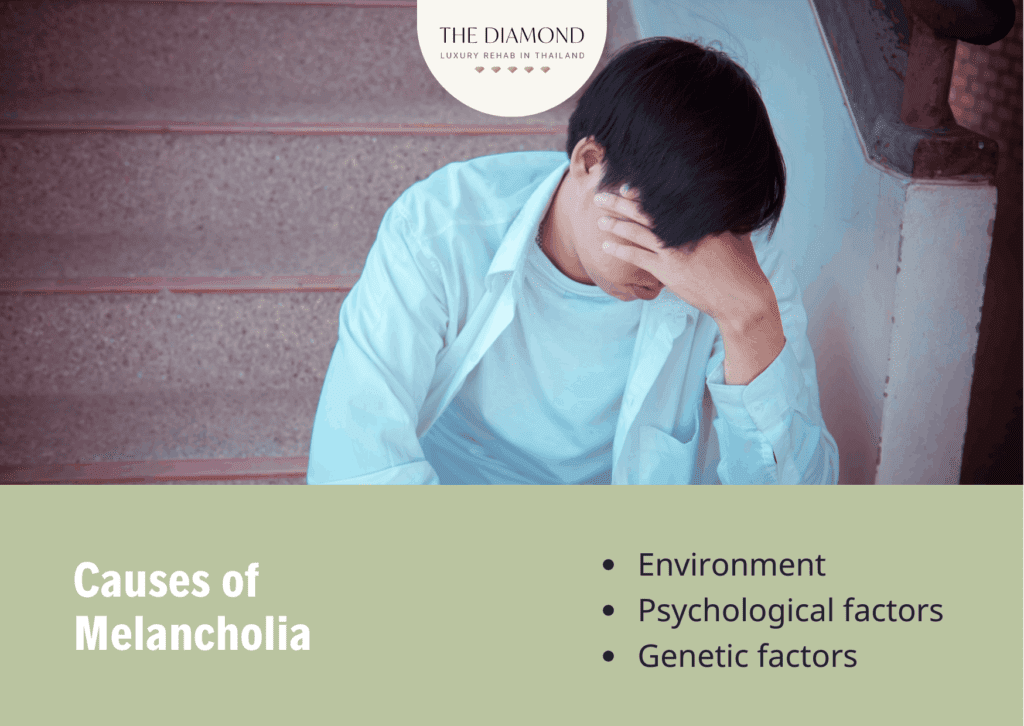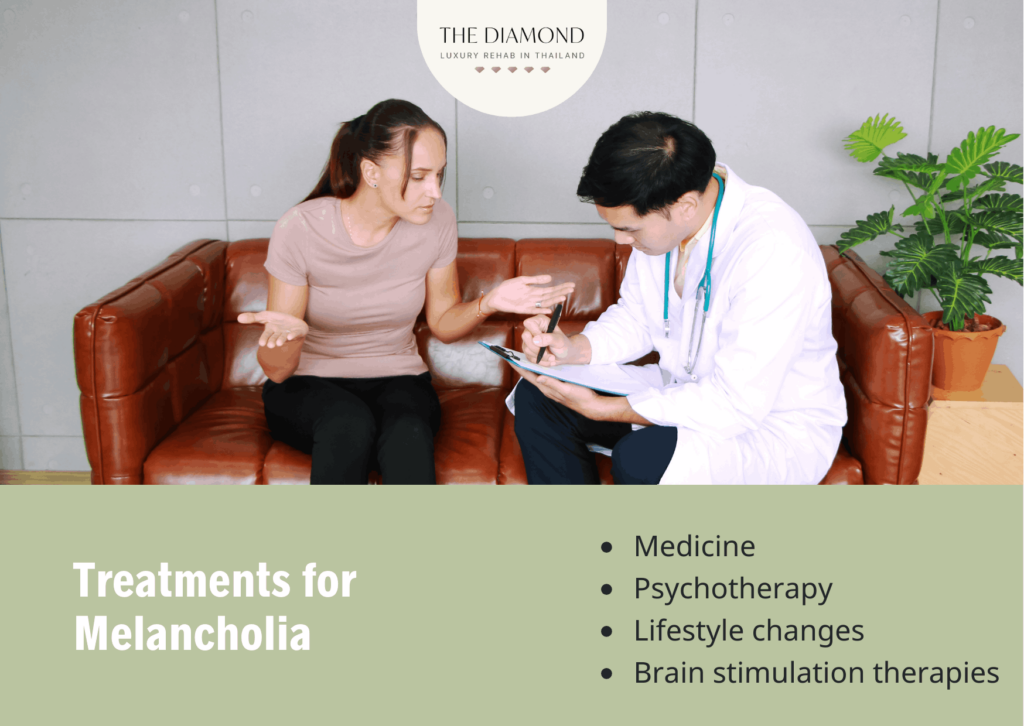Melancholia: causes, symptoms, and treatments

Melancholia is classified as a specifier for major depressive disorder, which means that a person is usually diagnosed as having major depressive disorder with melancholic features. When a person suffers from melancholia, their moods, thoughts, and emotions are affected.
The cause of melancholia is usually a combination of environmental, psychological, and genetic factors.
The main symptom of melancholia is showing little or no interest in previously enjoyed hobbies (anhedonia). Other symptoms of melancholia align with the general symptoms of major depressive disorder, such as sleeping issues and suicidal thoughts, but are usually much more severe.
The treatment of melancholia typically involves a combination of medicine, psychotherapy, lifestyle changes, and brain stimulation therapies. Treatment may take time and require patience and persistence, but with the right support and resources, many people can successfully manage their symptoms and achieve long-term recovery.
What is melancholia?
Melancholia, or melancholic depression, is a mood disorder that is classified as a specifier to a diagnosis of major depressive disorder, or depression, according to the fifth edition of the Diagnostic and Statistical Manual of Mental Disorders (DSM-5).
The term ‘melancholia’ as a mood disorder is derived from the word ‘melancholy’, which is defined as a feeling of pensive and deep sadness, according to Merriam-Webster.
What is the other term for melancholia?
Melancholia can also be identified as clinical depression or major depressive disorder (MDD), which is often used interchangeably. The National Institute of Mental Health defines depression as a serious mood disorder that affects how one feels, thinks, and acts. This definition can be applied to many mood disorders (including melancholia) that act as specifiers for the broad diagnosis of MDD.
Where is melancholia most common?
Melancholia affects many people worldwide as it is not limited to specific locations or groups of people. There may be variations in how different cultural groups react to and identify melancholia. However, there has not yet been sufficient research to show that melancholia is more prevalent in some parts of the world than others.
How common is melancholia?
Roughly 25%-30% of patients who suffer from major depressive disorder (MDD) present melancholic features, according to an article published in the Neuropsychiatry Disease and Treatment journal by Łojko & Rybakowski.
The World Health Organization (WHO) claims that approximately 280 million people across the world suffer from MDD, which can be diagnosed with several specifiers, including melancholia.
WHO continues by indicating that MDD is roughly 50% more common in women than in men, and a staggering 75% of people in low and middle-income countries receive no treatment. This can be due to several factors, including socioeconomic circumstances.
What are the causes of melancholia?

The causes of melancholia are multifactorial and involve environmental, psychological, and genetic factors. Even though biological factors seem to be the most prevalent, the development of melancholia can be traced to a combination of factors.
The causes of melancholia are listed below:
- Environment
- Psychological factors
- Genetic factors
1. Environment
Environmental causes of melancholic depression are primarily external and include chronic stress, financial difficulties, traumatic events, or even the change of season.
An article penned by Constans, Lenhoff, and Mccarthy in 1997 titled Depression subtyping in PTSD patients, suggests that patients diagnosed with PTSD (post-traumatic stress disorder) are more likely to experience melancholic depression episodes.
The link between chronic stress and depression with melancholic features has not been well studied. However, a 2004 article penned by H.M. van Praag in the Progress in Neuro-Psychopharmacology and Biological Psychiatry Journal suggests that chronic stress may eventually cause depression.
The environment (conditions) can cause melancholia since constant exposure to negative environmental factors is detrimental to one’s mental health.
2. Psychological factors
Psychological causes of melancholia can be either internal or external and include trauma, child abuse, negative self-talk, and rumination.
In his 2001 article, The Comorbidity of Major Depression and Anxiety Disorders, Dr. Robert Hirschfeld discusses the comorbidity of major depression and anxiety disorders. His work suggests that depression (with or without specifications like melancholia) is likely to co-develop along with other mental conditions, such as anxiety disorders.
Childhood trauma and other psychological factors can trigger symptoms of melancholia, such as disinterest in former hobbies (anhedonia), insomnia or oversleeping, and feelings of shame or guilt.
3. Genetic factors
Genetic factors that could cause melancholia onset refer to a family history of depression or certain genetic markers that are predisposed to this disorder.
A 1991 article published in the Journal of Psychiatric Research, Biological heterogeneity of melancholia: results of pattern recognition methods, states that melancholia and other major depressive disorders are heritable. This supports the argument that depression and its specifications are genetic.
Further research is still required to fully understand the impact that genetics has on the development of depressive disorders. However, it is agreed upon that certain genetic factors increase the likelihood of the onset of depression.
What are the symptoms of melancholia?
The symptoms of melancholia include disinterest, mood swings, physical symptoms such as aches, and suicidal tendencies. The most common symptoms of melancholic depression are listed below:
- Disinterest in former hobbies
- Appetite swings
- Insomnia or oversleeping
- Tiredness
- Memory issues
- Shame or guilt
- Suicidal thoughts
- Headaches or stomachaches
1. Disinterest in former hobbies
Disinterest in former hobbies can be defined as the withdrawal from activities and hobbies that were once enjoyed.
A person suffering from melancholia might feel social isolation due to the stigma surrounding depression in society, according to a 2014 article, Looking at the world through a frosted window: experiences of loneliness among persons with mental ill-health. This is why disinterest in hobbies is considered a symptom of melancholia.
To identify disinterest as a symptom, a diagnosis from a medical professional is necessary. Withdrawal from activities is not always connected to depression. However, if this symptom is exhibited, a person should talk to a doctor or therapist.
2. Appetite swings
Appetite swings are defined as either an increased appetite or decreased appetite. Increased appetite is much more common as a depression symptom.
Some people resort to ‘emotional eating’, which is when a person eats in response to negative emotions (like sadness or melancholy), according to a 2015 study conducted by I. Lazarevich et al. on the Psychometric characteristics of Eating and Appraisal Due to Emotions and Stress.
Emotional eating often leads to rapid weight gain and even crossing the threshold of obesity. On the other hand, a decrease in appetite could lead to other weight disorders like anorexia. Both are common symptoms of melancholia and go hand-in-hand with low self-esteem and shame or guilt.
A 2016 study, compiled by W. Simmons et al. and published in the American Journal of Psychiatry, showed that depression could lead to changes in appetite. These changes are linked to how certain areas of the brain are activated and respond to food.
To identify appetite swings as a symptom of melancholia, look for a rapid increase or decrease in weight as well as a change in attitude toward food. If this symptom is exhibited, it’s advised to talk to a dietician or a doctor as soon as possible.
3. Insomnia or oversleeping
Insomnia is defined as having trouble falling asleep or getting a night of good-quality sleep. On the other hand, oversleeping (hypersomnia) is defined as sleeping longer than usual at night or excessive tiredness during the daytime.
A 2016 study published in BMC Psychiatry and written by Liqing Li et al. indicates that insomnia is significantly associated with an increased risk of depression. Severe insomnia is often a symptom of melancholia; in most cases, medical attention is needed.
According to a 2008 article written by David Nutt et al. and published in the Dialogues in Clinical Neuroscience journal, there is a definite link between sleep problems and depression. These sleep problems are also often left unresolved and could be the main reason for depressive relapse or recurrence.
To identify insomnia or oversleeping as a possible symptom of melancholia, look for a change in mood, irritability, and sleep patterns.
4. Tiredness
Tiredness or fatigue is defined as feeling tired for a prolonged period of time, even when one has had a good night’s rest. Tiredness can become a symptom of melancholia when the person also suffers from sleep impairments.
According to the DSM-5, someone with melancholic depression could suffer from fatigue that would manifest in low motivation to perform daily tasks, difficulty concentrating, and the general feeling of lethargy.
To identify tiredness as a symptom of melancholia, look for excessive sleeping or prolonged fatigue. Other signs can also include irritability or constant expression of tiredness.
5. Memory issues
Memory issues or memory impairment is defined as the inability or difficulty to remember past events. In a 2018 study published in the Trends in Neurosciences journal, authors Dillon and Pizzagalli discuss how depression can alter specific sections of the brain, and this ultimately leads to memory issues.
Moreover, a 1995 study, Depression and memory impairment: a meta-analysis of the association, its pattern, and specificity, shows a significant association between depression and memory impairments. However, this study also indicates that memory impairments are not unique to depression.
Thus, when a person has trouble remembering recent memories or everyday facts, it could indicate an underlying depressive disorder, but it could also be indicative of other mental health disorders.
6. Shame or guilt
Shame can be defined as the feeling of worthlessness or inferiority, whereas guilt can be defined as feeling responsible and regretful of perceived wrongdoing. People with depression are likely to blame themselves for their mental illness and feel guilty due to the social stigma around it.
They might also feel guilt about past situations or mistakes. These feelings could escalate into negative self-talk and self-criticism, enhancing more depressive thoughts and feelings.
In a 2013 review paper published by Frontiers in Psychology, authors Pulcu, Zahn, and Elliott argue that major depressive disorder (and melancholia) is associated with elevated feelings of shame and guilt.
Shame or guilt can be identified as a symptom of melancholia when a person expresses or experiences constant thoughts of worthlessness and regretfulness.
7. Suicidal thoughts
Suicidal thoughts refer to thoughts about taking one’s life. There could be various reasons for someone to have suicidal thoughts, including depression with melancholic features.
Suicidal thoughts or ideation is not an uncommon symptom when it comes to depressive disorders. In fact, in a 2021 study published in Health Psychology Research, authors Sadeghian, Etesam et al. shows a strong correlation between suicidal thoughts and depression.
If a person expresses suicidal thoughts or ideation, it’s vital to enlist the help of a medical professional.
8. Headaches or stomachaches
Headaches or stomachaches are physical symptoms that are described as uncomfortable or severely painful. These physical symptoms can also be an indicator of depression, according to the National Institute of Mental Health.
Headaches or stomachaches could be identified as a symptom of melancholia, however, it’s important to remember that depression is diagnosed due to a combination of symptoms that occur for a prolonged period of time.
Who is at risk for melancholia?
Typically someone who has a family history of depression is more likely to develop depression with melancholic features, according to Maes et al. in the 1991 article, Biological heterogeneity of melancholia: results of pattern recognition methods.
Traumatic life events, chronic medical conditions, or substance abuse are all potential triggers that increase the risk of someone developing melancholic depression.
What can I expect from melancholia?
If you are diagnosed with melancholia, you can expect to experience a combination of symptoms such as fatigue, appetite swings, suicidal thoughts, sleep impairments, and disinterest in former hobbies. Many patients also describe physical symptoms such as headaches, stomachaches, and chest pains.
How is melancholia diagnosed?
Melancholia is usually first diagnosed as MDD (major depressive disorder) and then later diagnosed properly based on melancholic symptoms.
Before a patient is diagnosed with depression, a doctor conducts a diagnostic evaluation. This evaluation includes a physical exam, a thorough interview, and sometimes a blood test to rule out any other medical conditions. According to the American Psychiatric Association, the doctor will also explore family history and any other factors to come to an accurate diagnosis.
If said patient exhibits a combination of melancholia symptoms to a severe degree or for a prolonged period of time, the doctor or medical professional could diagnose them with depression with melancholic features.
This is supported by Caldieraro et al. in the 2015 article, Association between core-assigned melancholia and the melancholia subscale of the HAM-D, which concluded that melancholic patients exhibit more severe depressive symptoms.
What are the available treatments for melancholia?

Treatment for melancholia typically entails a combination of medications and therapy. The available treatments for melancholia are listed below.
- Medicine
- Psychotherapy
- Lifestyle changes
- Brain stimulation therapies
1. Medicine
Antidepressants are a type of medication that is typically prescribed to patients diagnosed with major depressive disorder, as well as anxiety disorders.
In a 2005 article published by Cellular Signalling, author Chirisse Taylor et al. explains how antidepressants work to alter the brain chemicals that are associated with depression, specifically serotonin, norepinephrine, and dopamine.
There is a debate regarding the effectiveness of antidepressants for patients diagnosed with major depressive disorder. A 2019 study penned by Jakobsen et al. and published in the BMJ Evidence-Based Medicine journal suggests that the benefits of antidepressants for depressive patients seem minimal.
On the other hand, Informed Health published evidence in 2020 that showed 40 to 60 people out of 100 who took antidepressants noticed an improvement in their symptoms.
Informed Health then continues by indicating that patients usually notice an improvement in their symptoms from six to eight weeks after starting the medication. Antidepressants are not a “one size fits all” medication, so it’s not uncommon for a doctor to change a patient’s prescription if no change is noticeable or evident.
Even though antidepressants are not a cure for melancholia, they do significantly help to manage the symptoms experienced.
2. Psychotherapy
Psychotherapy, also known as talk therapy, is a form of treatment for people struggling with mental health disorders or problems. It typically involves talking with a licensed professional in a one-on-one controlled environment about the symptoms and possible causes related to melancholia.
One of the most widespread psychotherapies used to treat melancholia is cognitive behavioral therapy (CBT), according to the Practice Guideline for the Treatment of Patients with Major Depressive Disorder (3rd ed.), published by the American Psychiatric Association.
This guideline also describes the goal of CBT as reducing melancholic depressive symptoms by challenging and reversing beliefs and attitudes that led to the diagnosed depressive disorder.
The meta-analysis, Psychologic Treatment of Depression Compared With Pharmacotherapy and Combined Treatment in Primary Care, published in Annals of family medicine in 2021, concluded that psychotherapy in combination with medication is effective when treating depression disorders.
The time it takes to see an improvement in psychotherapy for melancholia varies significantly due to multiple factors, such as severity, symptoms, type of therapy used, type of medications used, and willingness to participate.
According to Harvard Health Publishing, cognitive behavioral therapy is typically prescribed for 30-60 minute sessions spanning 12 – 20 weeks.
3. Lifestyle changes
Lifestyle changes refer to daily modifications that positively impact a person’s physical and mental health. Some of the best lifestyle changes to treat depression are getting enough sleep, exercising regularly, and avoiding substance abuse.
Depending on the symptoms and environmental factors, a doctor will recommend specific lifestyle changes that are targeted to work in combination with specific medications and therapies.
In a 2011 article titled Physical Exercise and Depression and published in the Physical Therapy Reviews journal, it was concluded that physical exercise could be an effective treatment for depressive disorders. Daily exercise is beneficial not only to MDD patients but also to general mental well-being.
Researchers have found that substance abuse is significantly associated with a greater risk of depression, according to a 2000 paper on Depression and the Severity of Substance Abuse penned by authors R Coelho, R Rangel, et al. Thus, eliminating substance abuse (alcohol or drugs) is a common treatment recommendation for depressive patients.
Lifestyle changes will not immediately alleviate melancholia symptoms, But, when used in combination with psychotherapy and antidepressants, a person will start to feel a difference in a few weeks or months.
4. Brain stimulation therapies
Brain stimulation therapies use electricity or magnets to stimulate specific areas of the brain. They are used as a treatment for severe cases of mental illness, including melancholia, anxiety, etc.
According to the National Institute of Mental Health, brain stimulation therapies are only really considered when other treatment options have been exhausted. Brain stimulation therapies are introduced if a patient does not seem to respond to a combination of medication, psychotherapy, and lifestyle changes.
One of these therapies that is often used to treat melancholia is electroconvulsive therapy (ECT). ECT involves using an electrical current to induce a seizure in the brain. This therapy is administered under general anesthesia and requires several sessions over a period of a few weeks.
In the 2004 meta-analysis, Efficacy of ECT in Depression: A Meta-Analytic Review published in the Journal of ECT, data showed that ECT is a valid therapeutic tool to be used in severe cases of depressive disorders.
What are the complications of melancholia treatment?
One of the biggest complications that can arise from melancholia treatment is the side effects experienced when using antidepressants. According to the NHS, some common side effects include dry mouth, constipation, blurry vision, dizziness, and weight gain.
An unexpected complication that might arise is treatment resistance. The patient might become frustrated when medications and psychotherapies do not immediately alleviate symptoms, which would probably increase the feelings of hopelessness that patients experience.
Can melancholia be treated?
Yes, melancholia can be treated through a combination of medication, psychotherapy, and lifestyle changes. In severe cases of melancholia, brain stimulation therapies, like ECT, could also be used as a treatment. Only a doctor or health care professional can assign an official treatment plan (combination of these treatments).
How to prevent developing melancholia?
The best way to prevent melancholia is to be proactive. If a person is aware of a family history of depression or melancholia, they should be on the lookout for possible symptoms or risk factors. One can preemptively implement lifestyle changes like daily exercise and make sure they get enough sleep, and this could greatly reduce the risk of developing melancholia.
Suppose a person is experiencing chronic stress or has had a traumatic event in their life recently. In that case, they should schedule an appointment with a therapist to talk about their experience and identify if they are at risk of developing a depressive disorder.
What is the difference between melancholia and depression?
Although the two seem similar, depression is a term for the broad diagnosis of major depressive disorder (MDD). Melancholia is used as a specifier for an MDD diagnosis, indicating a specific combination of symptoms and their severity. A patient would be diagnosed with ‘major depressive disorder with melancholic features’.
In a 2012 article, The difference between depression and melancholia: two distinct conditions that were combined into a single category in DSM-III, the author, Susumu Ohmae, highlights that melancholia is a more severe and persistent disorder than depression and will often require different treatment.
The five main differences displaying melancholia vs. depression include treatment, the severity of symptoms, physical symptoms, prognosis, and reduced ability to experience a sense of pleasure.
The treatment of melancholia is better with brain-stimulating therapies such as ECT, according to Treatment Response in Melancholia by W. A. Brown. On the other hand, depression is more often treated through psychotherapy and the use of medications.
The severity of symptoms in melancholia is considered to be higher and more persistent than in depression. Melancholic patients are also more prone to experience physical symptoms (insomnia, appetite swings, headaches, etc.), whereas depressive patients are more likely to suffer from mental symptoms.
Due to the severity of the symptoms related to melancholia, these patients would typically need treatment much longer than depression patients. Melancholia is also more likely to be chronic and recurs throughout a patient’s life, making the prognosis less favorable.
Finally, the most common symptom of melancholia is the complete lack of experiencing pleasure or having a prolonged feeling of hopelessness. This is not as common in the diagnosis of depression.

